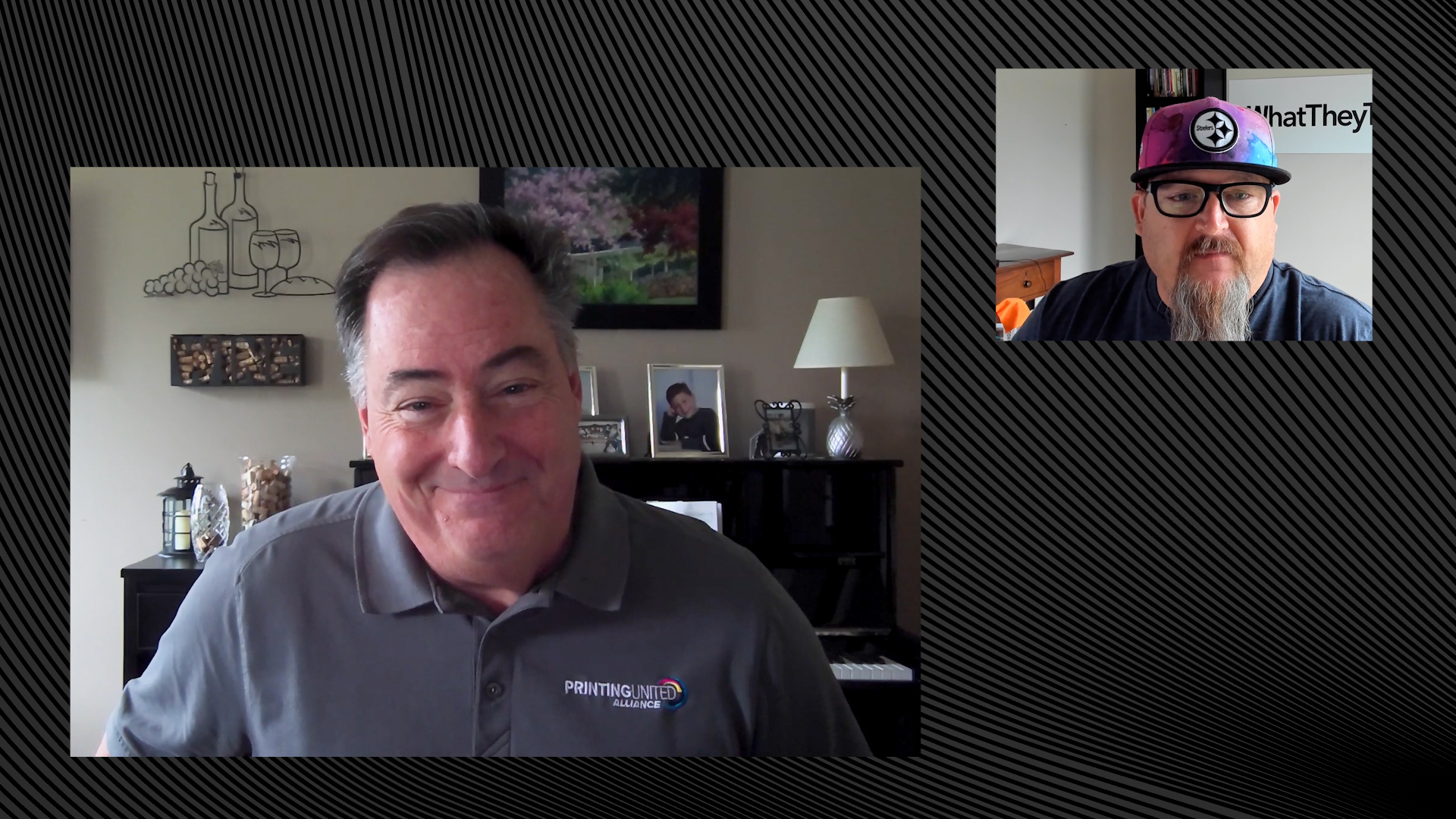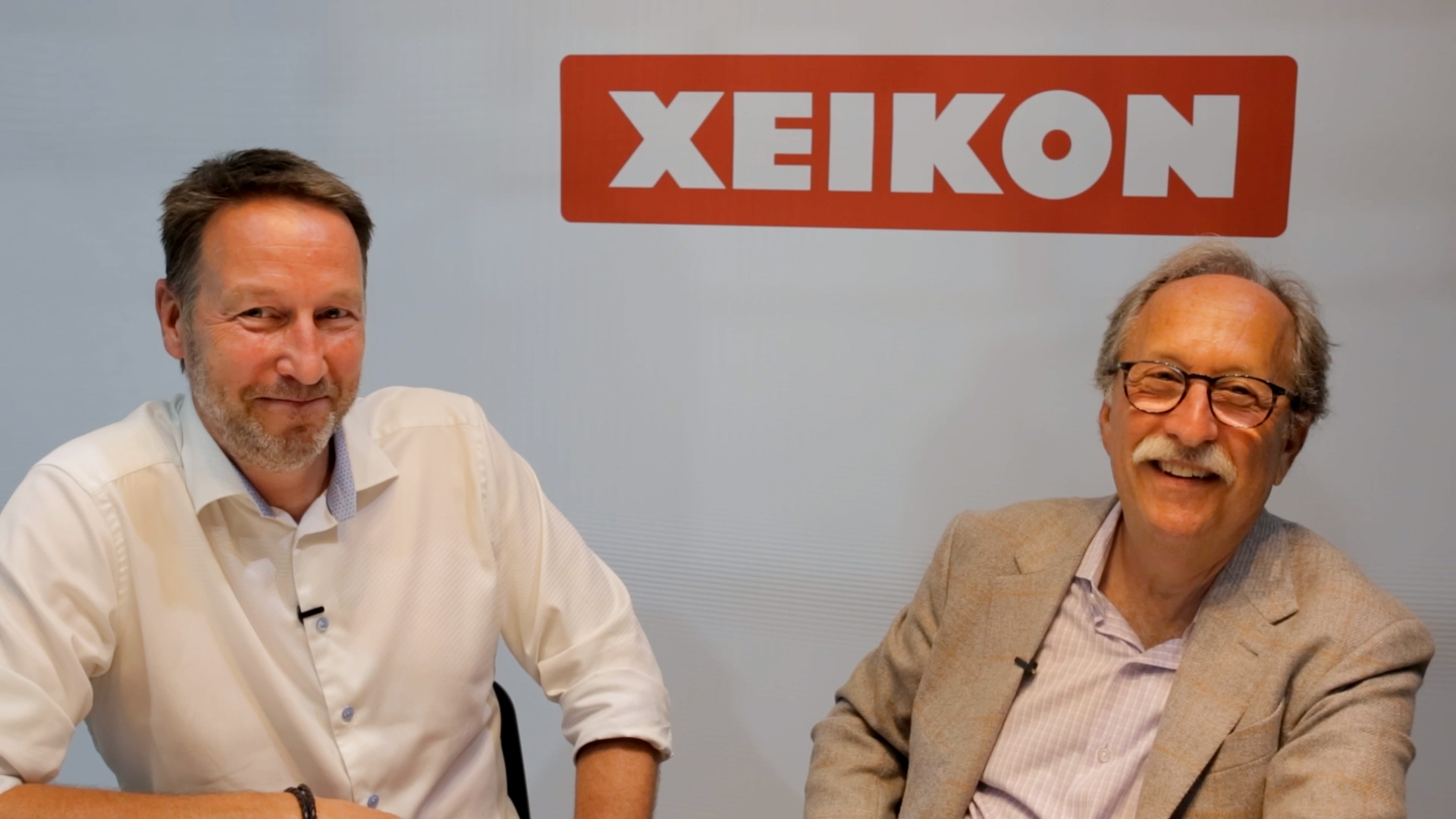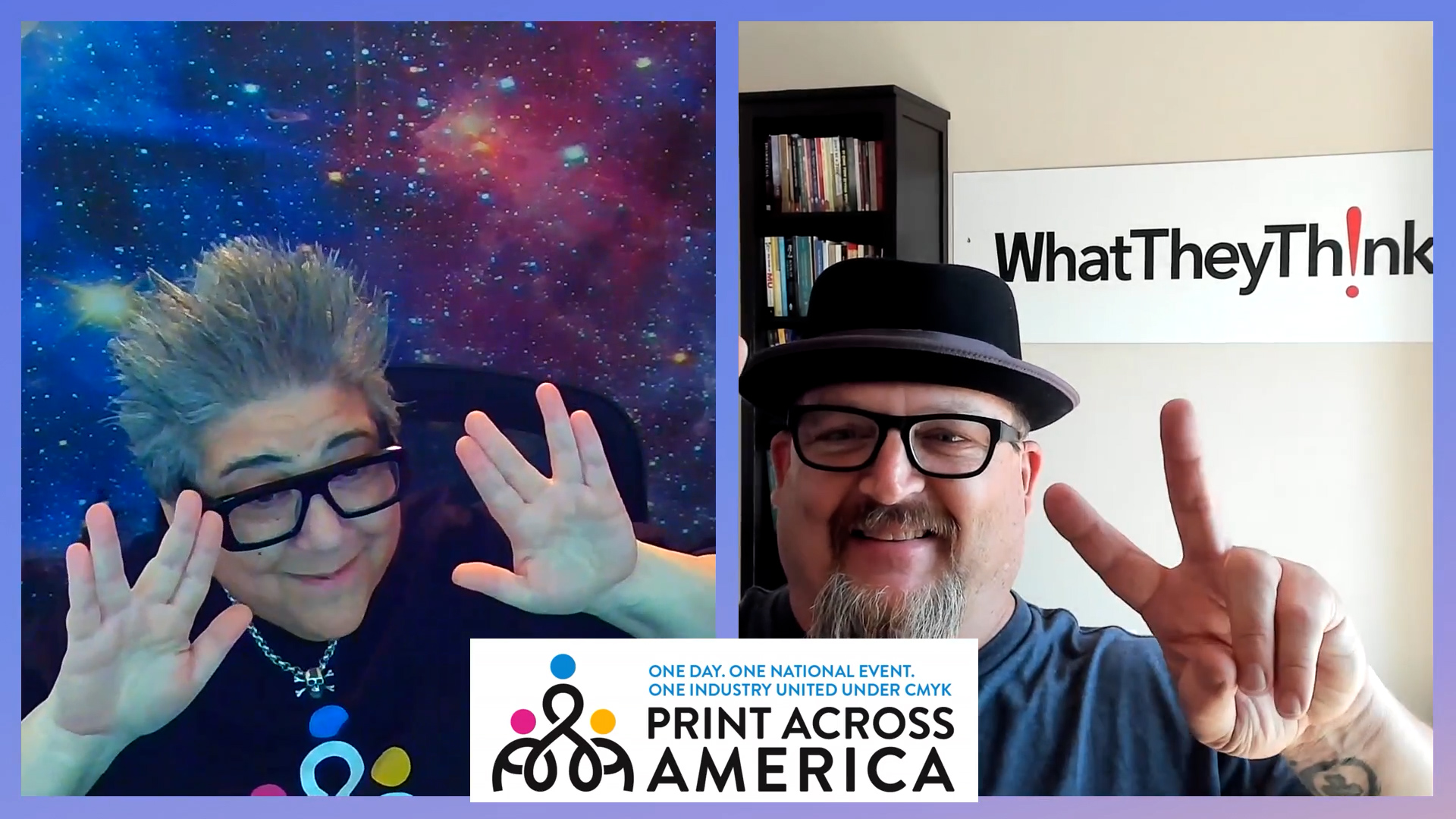Commentary & Analysis
Displaying 3401-3500 of thousands of articles
Insight You Need. Analysis You Trust.
Get the trusted insights you need to understand our evolving industry and emerging trends. Become a Premium Member.
Workflow Automation: Stories from the Trenches
Senior Editor Cary Sherburne recently had the opportunity to have in-depth discussions with three leading companies about their success with workflow automation and what it has meant for their businesses.
Stuff I Said in 2008: How It Turned Out
Eight years ago we were changing presidential paths as we are today, and Dr. Joe had a webinar amidst that tumult of the freshly declared recession, jittery markets, and that upcoming transition. This week, he goes into the archives and reviews what he forecast – and grades himself accordingly. He even gave himself an F for one of the forecasts – how did he do on the others?
Transformation with a Capital T: Great Advice for Print Service Providers
There is no question that digitalization is bringing major challenges to the printing industry. It is no longer enough to manufacture and sell products and services—value must be added. This article cites a recent article in the McKinsey Quarterly to highlight the importance of transformation in the printing industry.
Print Software Enables Your Business to Scale
Scaling your print business requires the removal of bottlenecks from order inquiry to accurate invoice payment. Your Print MIS is the system of record that can drive you to a more efficient business and enable you to scale.
Moving Pieces Around on the PE Chessboard – October 2016 M&A Activity
Billionaire Pritzker brothers capture ProAmpac, buy Vitex next day, Capital Partners win Outlook Group in secondary buyout, IBS Direct merges with Maestro Media Print Solutions and more.
“Push to Stop” the Presses: Heidelberg Demonstrates Concept of Autonomous, Navigated Printing
Imagine a press so thoroughly automated that it almost seems to be a member of its own crew. This is what Heidelberg says it has made possible with the concept it calls “Push to Stop.”
Agfa 3D Lens Technology Adds a New Dimension to Printed Signage
There was a time when I could describe lenticular imaging thusly: “You know those prizes that used to come in boxes of Cracker Jack, little cards that if you held it one way it displayed one image and if you held it another it would flip to another image?” It was a low-tech 3D effect or animation, kind of the analog equivalent of an animated GIF.
US Commercial Printing Shipments in Mild Downturn; Employment Consolidation Continues
US commercial printing shipments for September 2016 were down -$8 million compared to the prior year (-0.1%). On an inflation-adjusted basis, shipments were down by -$118 million. Interestingly, inflation-adjusted August shipments were up by +$118 million, making the net change for the two months zero.
US Employments Report: Not What the Headlines Said
The business headlines about the October employment report may have said “unemployment rate falls to 4.9%; payrolls grow +161,000,” but the details of the overall employment picture deteriorated.
Recovery Indicators Mixed Again
Last month's recovery indicators bounced back big from a dreadful report, but this month's have moderated. The ISM manufacturing and non-manufacturing new orders decreased, but they are still above the 50 breakeven level, showing growth. The non-manufacturing side is still strongly on the growth side of the line.
Omnichannel Content Publishing and Marketing to Be Demystified at Idealliance’s “INKredible” Conference
Idealliance is billing INKredible as “a showcase for innovators in orchestrated content marketing and publishing”: a category that most definitely includes print service providers.
Top 5 Web-to-Print Questions
Web-to-print is part of your self-service offering and an expectation of most customers. The following article covers the top five questions I hear around web-to-print.
Holiday Season is Right Around the Corner… What Are Marketers Thinking?
Most consumers begin purchasing for the holidays on November 1. If retailers wait too long, they miss out on valuable sales opportunities. This article provides strategies for attracting customers and driving them to engage with your brand as the holidays approach.
Color Your Work Exceptional
Are you planning to attend the Color Conference in December in Phoenix? If you have anything to do with color in your daily work, you should consider it. There have been many advances in color management as well as launching of new standards. This is the best place to get the scoop on all of it and rub elbows with the experts – consultants, printers, suppliers and brand owners who are passionate about color.
Q3 Real GDP +2.9%; Soybeans Lead the Charge?
Prior to the release of Q3's advance estimate of real GDP, the Atlanta Fed's GDPNow forecast was +2.1%. The official figure came in much better, at +2.9%. It is likely to be revised down slightly, but it was a much better showing than recent data.
Wide-Format and Specialty Printing: New Opportunities for In-Plants
A recent state of the in-plant industry report finds that in-plant printing departments are well-poised to expand their wide-format and specialty printing options—not just for their parent organizations, but for outside customers, as well.
National Retail Federation Forecasts +3.6% in Holiday Retail Sales
The National Retail Federation issued its forecast of holiday retail sales. It expects a +3.6% increase compared to 2015. But what's the real increase? After deducting for inflation, that's about +1.5%. If real GDP comes in at +2% in the October 28, 2016 advance report for Q3, holiday retail sales growth will be in line with the growth rate of +1.4% for the year. In some ways, this can be a good year compared to recent history. Holiday retail sales have averaged +2.46% since 2007, with a net after inflation of only +0.64%. On a per person basis, that's actually a decline in that period.
The Customer Experience Gap
Today’s technologies have completely transformed the buying process. A customer can browse a physical retail shelf, handle everything virtually by visiting an e-commerce site, or do a combination of both before making a decision. This article discusses the need for marketers to connect with customers wherever they are.
Where Is Print’s Place in a Digital World?
For years, people have been predicting the demise of print – beginning with the dot com boom of the early 2000s and the beginning of the digital age. The industry’s fate, said experts, was all but sealed thanks to the Internet. For distinct segments like printed newspapers, this prediction came true. The Internet and social media has transformed the news landscape in previously unimaginable ways – shifting consumer behaviour away from single paid to multiple often free and certainly freely available news sources.
Fenske Media Adds Real-Time One-to-One Video to the Customer Experience
We’ve been talking about cross-media, multi-channel, omni-channel – whatever you want to call it – for a long time. But now technology has arrived to add a brand-new element to these consumer experiences that is accessible to printing firms of all types. Read this article to find out how Fenske Media has harnessed real-time interactive video to achieve up to 284% increase in engagement and an 80% improvement in click-through rates, while still growing print volumes.
Apprenticeship, Training, and Skills Development in the Printing Industry: An Appraisal
The industry’s solutions for cultivating workforce talent aren’t perfect. But, given the graying of the industry and the thinning of its ranks in production occupations, it’s urgent to use them to their full extent.
Mobility and Print Align at an Opportune Time
There's nothing like print enriching itself, and mobile might be the way to do it. A surge in mobile information preference is underway. How should printers plan? Diving in of course, by turning on static print materials into Internet and other gateways. If printers have sidestepped the digital media revolution to concentrate on the media they do best, this may be an opportune time to enliven their offerings as technology, economics, and consumer preference seem to be aligning themselves in a very special way.
Mobile is at the Heart of Innovation for the Printing Industry!
Mobile devices are changing the customer experience and forcing organizations to rethink how they engage with their customers and employees. This article shares how CCG Marketing Solutions and Rethink CMYK have leveraged cross-media and mobile technologies to catapult their businesses forward.
Fall in Love with Your Customer’s Problems
The most important thing you can do to thrive during times of disruption is to learn more about your customer’s problems. What you solved for customers in the past might not be relevant in the future, what you can solve in the future will reinvent may reinvent your business.
The Decline and Fall of Marketing
Marketing is getting pushed out of the boardroom and strategies built around customers are going with it. It’s a self-inflicted banishment, and marketers – including many CMO’s – are worried about it. For Graphic Communication firms, this presents a two-fold challenge and opportunity.
All Projects Great and Small: Benicia, Calif.’s ColorZone Helps Small Businesses Grow
When Joshua Feller bought a failing trade show graphics company in 2005, he had little idea that it was the start of a journey that would take him into the world of wide-format printing—and the burgeoning world of digital label printing.
HP PageWide: Georgia-Pacific Deal Revealed; Corrugated Print Systems Ramping Up
The first sale to a U.S. customer refocuses attention on the 110" inkjet platform with which HP intends to revolutionize printing on corrugated.
The Power of Print to Change the World
Print began to flex its muscles and show its power not long after Gutenberg invented movable type. Print was a causative factor in the rapid spread of Martin Luther’s teachings in the first half of the 1500’s. Andrew Pettegree has done an excellent job of presenting a blend of European history of the period, the story of Martin Luther and how print influenced it all in Brand Luther. Highly recommended reading!
The Thread that Connected Washington, DC and the Smithsonian Institution With Cal Poly
I recently returned from Washington, DC after witnessing, firsthand, the opening of the 19th and final Smithsonian Institution museum on The Mall, the National Museum of African American History and Culture (NMAAHC). I was part of a group of 32 people, mostly from San Luis Obispo (California) County, who attended. We were all there, not only to witness history in the making, but as a tribute to The Late Joe Schwartz, former lithographer and “street photographer,” whose photographs became one of the first and one of the only permanent exhibits adopted by the Smithsonian Institution to be prominently displayed at the Museum.
Per Capita Pounds of Mail
Since the beginning of the economic recovery in 2009, first class mail is down by -12%, standard mail (discounted bulk mail) down by -18%, and periodicals down a whopping -32%.
Apex: An Industry Incumbent that is Innovating with Technology
According to McKinsey & Company, industry incumbents must face the digital disruption and determine what they can do differently to survive or even thrive in the future. McKinsey’s rules apply to a wide variety of industries, but this article highlights how Apex Revenue Technologies is facing the digital disruption with technological innovations.
At Graph Expo 2016, a Respectable Showing for Labels and Packaging
Although not a show about labels and packaging per se, Graph Expo proved to be a worthwhile place to go for information on innovative ways of producing them.
No More Isolated Print Software Solutions
Every print software decision needs to be considered within the context of your end-to-end workflow. Isolated or point solutions are costly both short and long term. As jobs travel through your production and business workflows – it is vital that the various pieces of print technology can communicate with each other without human intervention.
Managed Print Services Take Center Stage – September 2016 M&A Activity
HP commits to paper-based future, private equity invests in managed print services, ink manufacturers consolidate, Hibbert acquires RedShark, Deluxe promotes promotional products, and more.
Graph Expo 2016 Highlights
Despite its move to Orlando after 20 years in Chicago, Graph Expo 2016 exceeded expectations according to most exhibitors and attendees. In this article, Senior Editor Cary Sherburne shares the highlights that caught her attention at the show.
Recovering Recovery and Quadrennial Snapshots: More Logical than it Sounds
For once the employment report was bad on the outside but good on the inside. Printing employment continues to show consolidation effects. The recovery indicators have their own recovery. August printing shipments are big, making up for July’s disturbing decline. Dr. Joe’s good Graph Expo included a visit to the Printerverse and a digital book discussion worth watching.
McKinsey’s Guide to Digital Disruption: Lessons for the Printing Industry
The September 2016 issue of McKinsey Quarterly included an article entitled An Incumbent’s Guide to Digital Disruption that offered insight on actions that businesses can take today to remain competitive in today’s digital age. This article provides a synopsis of the McKinsey disruption lifecycle and explores how the printing industry is being affected today.
Top 3 Challenges to the Print Software Sales Process
Mistakes get made during the print software sales process because there is a lack of common understanding, a pressure on the vendor to say yes to every challenge presented, and a tendency to focus on solutions rather than the problems.
Q2 Real GDP Revised Up to +1.4%; Durable Goods Orders Contracting for 20 Months
Real GDP for the second quarter got its final revision, and was raised from +1.1% to +1.4%. Regular readers know that we prefer to look at real GDP on a year-to-year basis, excluding inventories, to give a better long-term view of the economy. The second quarter had an inventory correction, which seemed overdue.
SGIA 2016 Wrapup: This—and Next—Year’s Models
A collection of new products and product previews that were seen on the show floor at last month’s SGIA Expo.
Materials Matter at Graph Expo and Beyond
At Graph Expo 2016 paper suppliers were clustered in the Materials Matter section of the show floor, described as the “hub that celebrates the essential role materials play in the print ecosystem.”
Graph Expo 2016 and the Satisfactions of Scalability
Graph Expo’s first outing in Orlando proved that how large or small a trade show is matters less than how well it fits its surroundings—and vice versa.
Print Supply Chain Optimization: A Critical Marketing Priority
Marketers are spending billions of dollars producing, warehousing, and shipping marketing literature, packaging, documentation, point-of-sale displays, premiums, giveaways, signage, and handouts for all channels of market contact and engagement. This article explores how managing and controlling this portion of marketing operations can materially impact go-to-market effectiveness, increase business value, and create a competitive advantage.
The Museum of Printing Exhibits Its One-of-a-Kind Collection in a New and Much Improved Venue
After 38 years, multiple relocations, and herculean labors, this extraordinary collection has a permanent home and a compelling story to tell.
Closing the Personalization Gap
Even though today’s consumers are inundated with marketing-related messages, only a fraction of these messages actually get the consumer engaged. This article explores how marketers are using personalization to create customized communications that help them stand out from their competitors.
Manufacturing May Be Declining, but Real Retail Sales are Still Positive
Data about manufacturing from the ISM and the Commerce Department have show a contraction compared to the prior year. In some cases that slowdown and contraction has been in process for 18 or more months. Retail sales and consumer spending have been the brighter spots of the economy. The inflation-adjusted growth rate of retail sales has been slowing since the beginning of 2015.
Buying and Selling Print Software by the Pound
When you buy and sell software by the pound (# of features), you get distracted as a buyer as to what business challenge is actually most important to solve. As a vendor when you build software by the pound you keep adding without going back and refining the core features of your solution.
Hyde Opinion: the Sale of DG3 to Resilience Capital Partners
DG3, a significant player in the NYC metro, national and international market for commercial and financial printing, has entered another phase of its storied existence of acquisitions, going public, sale of the company, management buyout, return of the founder, sale to private equity and now a secondary sale to private equity and special situation fund Resilience Capital Partners.
A Toast—and Another One—to the Genius of Corrugated
Corrugated packaging protects effectively, presents handsomely, and succeeds environmentally. What’s not to like or to give credit where due?
Traditional Publishing Ebbs, and Oh, Those CMOs
Remember that “content is king” thing? The king is losing money. Worldwide ad agency Carat is forecasting moderate growth in advertising, but major shifts in the way ad budgets are spent. It's a fascinating look at worldwide communications with significant implications for printers of all sizes. And then those CMOs... just when they think they have it figured out, they're getting fired again.
You Are the Package. Do You Like What You See?
We interact with packages so much and so often that we sometimes begin to merge with them—and they with us.
SGIA Expo 2016 Kicks Off in Las Vegas
What happened at this year’s SGIA Expo may have happened in Vegas, but it’s not staying in Vegas. Our report from Day One of the show.
Book Publishing: Printed Books Live On!
Even in today’s digital age, printed books are alive and well. The death of printed books has been greatly exaggerated, and emerging technologies and consumer preferences are converging. This article explores the tools and techniques that can help resolve the supply chain.
Pew Offers Essential Insights into Book Readership
The Pew Research Center's recent report about book reading gives us a peek at the relationship of print and digital media. The report says “A growing share of Americans are reading e-books on tablets and smartphones rather than dedicated e-readers, but print books remain much more popular than books in digital formats.” The chart shows what formats their respondents used in the year prior to the survey. Only 6% were digital-only readers. The report states that 26% read no book in the last year; they may have read other things, but not books. Contrary to many reports about the “demise” of e-books, that has risen from 17% to 28%. It's been stuck there for three years. Print-only readers were 39% (remember: that used to be the entire market of book readers). Print and digital readers are now at 29%. Add the 6% digital-only, and you're at 35%. Content needs to be available in multiple media. Media selection is based on many factors, such as time, convenience, price, income, education, age, and others. Pew also offers insights into the use of audiobooks. The report is free can be downloaded from the Pew Research Center. One other note: when you hear that tablet sales are down or that e-book reader sales are down, keep in mind the versatile use of smartphones and their growing role in content engagement. Among readers 18-29 years old, 22% of them are reading books on their smartphones, 4x more than read them on e-book readers.
The Number 1 Factor in Successful Print MIS Implementations
Implementing Print MIS software is an undertaking that touches every corner of your business. The belief system you go into this process with determines your success more than any other factor.
Thomson Reuters Sees Opportunity in Monochome Book Printing
Thomson Reuters Core Publishing Service focuses on short and long runs of monochrome legal and other publications on lightweight papers. Adding a HP PageWide Web Press T360 with an inline Magnum Flexbook has significantly improved efficiencies for mid-sized to short runs. Learn more in this article sponsored by HP.
Private Equity LOVES Labels – August 2016 M&A Activity
Massive global private equity funds move aggressively into the label and related printing segments, marketing services provider Firespring acquires Jacob North and does good, Supremex rolls up US envelope production, the newspaper chess game goes on and more.
Employment, Shipments, and Profits: The Objects of Inflection?
Employment and GDP reports did not inspire, and July's printing shipments made us ponder. In the printing profits data, smaller did better, again. Ponder this: have print's gargantuans lost their economies of scale? Big was supposed to be better, smarter, and sturdy. It turns out that the big interest in big printers was of the loan payment kind. If pondering makes you hungry, you might consider some food shopping. They say the price of food is down but, alas, we learn it's just less up.
Automation and Wide-Format: Where Are We?
Whether it’s only a select few tasks or an entire production workflow, automation is slowly but surely coming to wide-format printing. How is that possible?
Four of Six Recovery Indicators Fall, Two Now Below Levels of Last Recession
The recovery indicators were hit hard last month last month, with two of them falling below the levels at the start of the last recession. Those levels were the readings of these indicators for December 2007.
Transaction Documents: Consumers Still Like Paper!
Transactional printing is the original variable data printing application. Each bill, statement, invoice, check, or explanation of benefits has content that is unique to the specific individual. Research continues to suggest that business expectations for paperless delivery adoption always exceed realized gains.
Konica Minolta: Moving into Production and Industrial Print
In this article, David takes a look at Konica Minolta and the company’s new strategy relative to Production Inkjet, Industrial Print, and building a Software eco-system, with a different approach than its competitors.
US Commercial Printing Shipments Have Rough July
The reversal in trend for US commercial printing shipments went from somewhat benign to significant in July's data. Last year, the industry was relatively stronger than 2014, but shipments have been on a downturn for the last four months of reporting.
Pixartprinting: VistaPrint’s Expansion into Upload-and-Print
Inevitably, Cimpress (parent company of VistaPrint) is expanding beyond its roots with the micro business and the business card product. Pixartprinting, a 2014 Cimpress acquisition, targets the creative professional with a 100% upload-and-print model supporting an ever growing collection of product workflows.
Creative Sign Designs Spurs Collaboration with Dry-Erase Paint
As Creative Sign Designs was preparing to remodel its facility, President & CEO Jamie Harden came across dry-erase paint from ThinkPaint and immediately saw the benefits, both for his own staff and as a potential new revenue stream for the business.
Packaging Innovations Are in the Vanguard of the Fight to End Food Waste
Food waste is a shameful spectacle wherever it occurs. The problem is global, but so are efforts to solve it with new solutions for extending the edible lives of packaged foods.
Future Focus: Becoming a Strategic Customer Communications Partner
When we talked about marketing services five years ago, the focus was on variable data and creating a personalized URL that linked to a landing page with pre-populated information. Although these capabilities are still important, today’s customers are seeking more. They want a strategic partner that will help them with their customer communications strategy.
Making Great Software is Humbling
Coding is one aspect of software. Making great software takes a team of well-coordinated resources. When we oversimplify software to just a coding event, we get unexpected results
Report from drupa 2016: The Latest in Short Run and Digital
What will motivate packaging printers to adopt digital presses? Personalization may be a key selling point, but it isn’t primarily what will drive installation of these machines.
SGIA Expo 2016 Heads Back to Las Vegas
Next month, the annual SGIA Expo heads to its West Coast home at the Las Vegas Convention Center. Two of this year’s big topics are garment decoration and 3D printing—and it turns out they are not mutually exclusive. Here’s a preview of this year’s show.
Real GDP for Q2 Revised Down Slightly to +1.1%; Durable Goods Orders Still Contracting
The latest revision of real US GDP for Q2-2016 dropped from +1.2% to +1.1%. The estimate for Q3 from the Atlanta Fed is above +3%.
Quad/Graphics: A Focus on Defining the Future of Customer Communications
Marketers face many obstacles when communicating with customers. Reaching customers is more difficult than ever before, and marketers often struggle to determine the right media and message. This article explores how Quad/Graphics is helping marketers and publishers capitalize on print’s ability to complement and connect with other media channels.
E-Commerce and US Retail Sales
E-commerce has been running at the rate of 15% annual growth for many years, but is just 8% of retail sales. That seems tiny in relation to what we've seen happen to print promotions like catalogs and direct mail, and the rise of zombie or troubled shopping malls. The problem is that big ticket items, like autos, raise the size of retail sales. Those items may be researched online, but their actual purchase is not made until it is transacted at a car dealer. Restaurant purchases are also a distorting issue in the data. This chart explains it a little better. E-commerce sales is at the bottom (red line). In the second quarter, it was just short of $100 billion. The blue line is retail sales less vehicles and parts. The green line has food service sales deducted. The black line had e-commerce sales deducted, and shows retail sales through traditional channels. Those sales through older channels are lower than they were at the start of the recession. All of the growth in non-auto and non-restaurant retail for the last decade has occurred in e-commerce channels.
Canon Promotes “See Impossible” and “One Canon” Themes at Press Event
At an industry analyst/journalist summit held early this month, Canon unveiled its “One Canon” approach to the business, further integrating Canon U.S.A. Business Group, Canon Solutions America and Canon Information & Imaging Solutions to provide a seamless customer experience. WhatTheyThink Senior Editor Cary Sherburne also interviewed Canon Americas Chairman & CEO and Senior Managing Director of Canon Inc. Joe Adachi during the event.
Creating Customer Convenience with Web to Print
Web-to-Print isn’t for the printer; it is a self-service option for your customers so that ordering from you is more convenient. Customer preference is strongly in favor of self-service options for virtually all business processes, print is no exception.
Printing Industries Alliance Hosts Wide-Format Printing Panel
The Printing Industries Alliance hosted an all-day drupa recap at Manhattan’s Club 101. Among the day’s presentations and panel discussions was an extensive conversation about the current state of wide-format graphics and opportunities in the market for commercial printers.
The Lure Of Digital Packaging: A Printing Industry Growth Area
If the rise of digital printing for packaging is starting to look irresistible, there are reasons —technological and market-driven—behind the momentum it is gathering.
Straightforward Economics; Can You be Trusted with “The Good Leads”?
There are signs of economic slowdown despite what cable's talking heads say. The disparity of consumer prices and printing prices help explain the forces of consolidation and why print businesses need to have a constant review of their costs and value creation capabilies. The Australia Census folks may need to paper over a computer problem. Nothing helps improve sales more than leads, sales leads, the good leads.
Understanding the Customer Journey
Historically, marketers have had a relatively straightforward task—to fill the sales funnel and keep prospects moving through it. Marketers would place an advertisement in a newspaper, create a television commercial, or send a direct mail piece to entice consumers to come into their stores to make a purchase. Times have changed.
The Role of Live Events in the Print Industry
Going to live industry events is a great opportunity on many levels – get out of working in your business and focus on working on your business. Building relationships with peers and vendors is critical to your future success, live events are where these relationships are cemented.
Avery Expands Its Reach in GHS Labels
Embracing international standards, OSHA now has a new set of rules for designing labels used with hazardous materials. Label giant Avery offers tools to make compliance easier.
Hyde Opinion: Recent Paper Distributor Consolidation
It’s no surprise that Lindenmeyr has recently announced that it had acquired Graphic Paper, a paper distribution company based on Long Island, New York. According to The Target Report, there was significant M&A activity in the paper industry during 2015, of which seven transactions involved the acquisition of formerly family-owned distributors of printing papers.
The Cube-Shaped Canvas
In the latest installment of our occasional Wide-Format 101 series, we offer a general overview of wall, floor, and window graphics.
drupa 2016 is behind us. Now what?
Printers from around the globe flock to drupa every four-years to see the latest innovations. The highlights of these introductions have already been well-covered by our respected colleagues in great detail. However, the drupa summaries to date do not provide Service Providers with insight into the one key question that every service provider is asking, “How do we feed the beast?” That is, if I make the leap to digital printing, or wish to expand my presence, how do I ensure a profitable stream of work that will result in a return on my investment?
How to Capitalize on the Mobile Addiction
There is little disagreement that smartphones and other digital devices are having a disruptive impact on businesses as well as consumers on a global basis. There is no question that today’s mobile addiction represents a tremendous opportunity for service providers. This article explores how savvy service providers are supporting clients in their drive to reach customers.
Commercial Printing Employment: Production Employees Up +0.7%, Administrative Down -8.1%
Since January 2013, the number of production employees in commercial printing establishments has grown slightly, and is up +0.7%, from 307,700 employees to 310,000. Other employees, which are mainly administrative including sales, are down -8.1%, from 145,000 to 133,300.
Maintaining Multiple Web-to-Print Solutions
Printers get frustrated with complex software solutions, this frustration often results in the purchase of additional complex software solutions. Don’t rush to buy your way out of the challenge – it might be more effective to learn your way out of it by doubling down on your commitment to the software you already have.
How Do You Print a Golf Ball? – July 2016 M&A Activity
Hi-tech inkjet company Xaar makes inroads into US industrial printing market with acquisition of pad printing company, 4over acquires another trade printer, Nationwide Argosy divests last operating company, newspapers consolidate, corrugated segment is active and more.
CI Flexo Technology for Packaging and Family Values for Leadership Are Showcased at PCMC Impact 2016
The Paper Converting Machine Company is North America’s only remaining manufacturer of CI flexo presses. It’s also distinguished by the humanistic style of its leadership—a management philosophy that cherishes employees as family members.
Changes in Employment, the Economy, and Print
Nothing is ever what it seems, and that goes for last week's employment report (again). Ripples of consolidation are seen in printing employment data. There's growth in the advertising and design markets, and pain in publishing. Dr. Joe puts GDP and printing shipments into historical context. The iPhone is a means to explore the topic of trade. No, Dr. Joe's not trading in his iPhone.
US Commercial Printing Shipments for First Half of 2016 Up +1%; Q2 Shipments Decline
In data released by the US Department of Commerce, commercial printing shipments for June 2016 were down -$58 million compared to last year (-0.8%). On an inflation-adjusted basis, shipments were down -$130 million (-1.8%).
Marketing Isn’t What it Used to Be… Your Customers Want Something Different!
Today’s customers are adept multi-taskers who are capable of using multiple devices simultaneously. This means that marketers need new ways to cut through the clutter and get their messages across. This article explores techniques for delivering relevant data-driven content to effectively reach target audiences.
Recovery Indicators: 3 Up, 2 Down, 1 Unchanged
The NASDAQ had a good month, rebounding by 6.5% last month. Compared to last year at this time, the NASDAQ is up +0.6%, which is a negative return compared to inflation (less inflation it is -0.5% because the CPI is +1.1%).
The Question is the Most Powerful Sales Tool
Customers come to printers to solve communication challenges. Transactional customers get their specific challenges solved. Transaction print is a tough business these days. Printers who inquire about and look to solve bigger picture challenges develop partners with their customers, moving above the transactional level.
GDP Revisions Show Declining Growth Rate Since 2014
The annual multi-year revision of US GDP data was released on Friday. The new data reflect more complete reporting of the thousands of data series that are used in the calculation of GDP and less reliance on estimated data. The revisions cover GDP from 2013 to the present reporting.
Fujifilm Introduces EUCON as the Press That Makes Inkjet Feasible for Flexible Packaging
The disconnect between flexible packaging and inkjet printing is wide, but not necessarily unbridgeable. Fujifilm thinks it has the answer in an innovative LED-UV inkjet press it showed at drupa 2016.
Insight: Four Key Trends Shaping the Industrial Packaging Market
Making packages more recyclable, lighter, shapelier, and safer will be the principal drivers for the industrial packaging market through to 2020.
Pokémon Go… You Might Want to Pay Attention!
Officially launched on July 6, Pokémon Go is a mobile application that is sweeping the nation. This article explores how the app promises to expand the opportunity for Augmented Reality, and also highlights a few other recent examples of the technology.
S&P 500 Real Sales per Share Reflects Struggling Economy
A way of judging the health of the economy is to calculate the inflation-adjusted sales of all of the companies in the S&P 500 and divide it by the total number of public shares. This index should have a natural upward bias. S&P 500 companies are very large, and acquire or merge with other companies, many of which are outside of the 500 companies. Buybacks of stock, which has been a trend of note these last five or so years, reduce the number of shares, or slow the growth in shares, reduce the denominator, again, giving it an upward bias. Instead, this measure has suffered. It peaked in 2007, and has yet to surpass that level. This means that corporate profits, which have generally been good (though slowing lately) have been managed by refinancing of debt to lower interest rates and reductions in costs and expenses. Those better profits are not the result of increased revenues. Slow, sluggish economic growth is reflected in these figures, and is a reminder that one should not look only to GDP as an indicator of the true health of the private sector.
Teach Your Daughters to Negotiate
The recent move by the U.S. women’s national soccer team (USWNT), to ask for a raise is leading by example for women of all ages. Their performance from top to bottom has been exemplary, on and off the field, and for them, this would be a performance-based raise. As it turns out, simply “asking” requires the courage to work against how we’ve been socialized to behave as females.
- Innovations in Inkjet for Textile Production – live webinar
- Buying Inkjet Part 1: Does This Printer Make Me Look Good?
- LabelExpo 2023: Launches and Trends – Part 2
- Driving profitability with cut-sheet inkjet
- Zero Trust Environments for Inkjet Printing
- Kevin Roman on the evolution of professional services needs
- LabelExpo 2023: Launches and Trends – Part 1
- Inkjet Gets into “Hard Core” Applications
© 2023 WhatTheyThink. All Rights Reserved.








